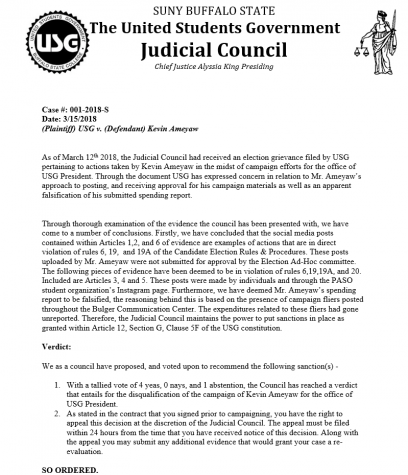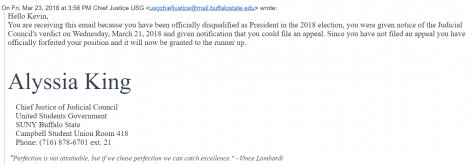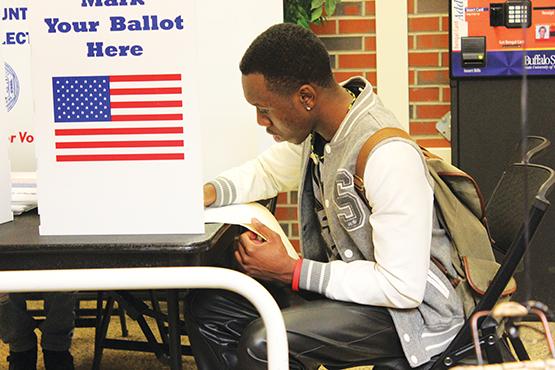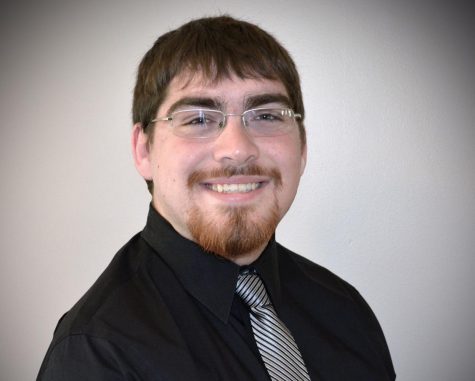Dispute involving USG presidential election still unresolved
April 5, 2018
Kevin Ameyaw won the election for United Students Government (USG) President in March by 128 votes, but as it stands right now he will not be president next year.
That’s because Ameyaw was disqualified after an election grievance was filed against him for posting campaign materials on social media without having permission, something that he admits he did.
However, the way the USG Judicial Council handled the situation is what concerns Ameyaw.
On Wednesday, March 14, the day before the election closed, Ameyaw received an email from USG Program Coordinator Lynn Korn that an election grievance had been filed against him.
The next morning, Assistant Chief Justice Francis Malone emailed Ameyaw asking to him come in for hearing in front of the council before 3:30 p.m. Ameyaw then contacted Malone and asked if he could explain himself to Malone and pass it along to the council, Malone agreed.
In the afternoon, Malone emailed Ameyaw again and informed him that the council was unable to meet within the 48 hours following the filing of the grievance and according to the Council’s own by-laws, they cannot give a verdict.
As per USG Judicial Councils’ Instructions for Filing a Grievance Article IV, Section B, Clause 2D:
“The Judicial Council will convene twenty-four (24) hours after an elections grievance has been filed and a decision will be issued twenty-four (24) after the Council has convened.”
This also appears in the USG Constitution in Article XII, Section I Clause 2.
So, Malone told Ameyaw that “Acting as Assistant Chief, I have decided that it would be inconsistent with our moral and professional standards to issue a verdict past the deadline that we were supposed to adhere by.”
However, on March 21, a week after the grievance was filed, Ameyaw received an email from Chief Justice Alyssia King with a verdict that he had been disqualified from running for president.

Ameyaw did not appeal the decision because he believes the verdict is void according to the council’s own by-laws and the USG Constitution along with the received verdict from Malone the week before.
“This was past the time limit of the constitution,” Ameyaw told The Record. “I know the constitution very well and I did not appeal to this because in the constitution (the verdict) is done and void. By appealing to it, I would be showing I don’t know the constitution.”
The verdict from King was dated for March 15 but was not sent to Ameyaw until the March 21 thus he believes it wasn’t officially issued.

Ameyaw received another email from King on March 23 telling him that he had been officially disqualified from the Presidency since he forfeited his appeal.
Ameyaw then got in contact with Malone, who told him that USG President Monique Maxwell has the final say on the disqualification. He then screenshotted the image of the disqualification verdict and sent it to Maxwell, who pressed the disliked button on iMessage and told him she was unaware of the situation.
“To me, the president is the one who oversees the judicial council,” Ameyaw said. “When I saw that I was very bothered.”
This past Monday, Ameyaw went to the USG Business office to meet with King and asked about an appeal.
According to Ameyaw, King told him that he couldn’t appeal the disqualification because the verdict was sent on March 21 and the appeal would have needed to be made within 48 hours.
Ameyaw told King that he couldn’t appeal the verdict because it was void and then asked why the verdict from King wasn’t sent within the 48 hours of the grievance being filed. King responded by saying the council had messed up but again told him that his appeal needed to be made within 48 hours of the verdict (sent from King).
Ameyaw persisted and after being told a third time by King that the appeal time had passed, told her he was filing a grievance against the council.
Ameyaw then urged Maxwell to come to the office and spoke to her.
After speaking with Ameyaw, Maxwell brought in King who told Ameyaw that Malone acted on his own when he sent out the verdict on March 15 and the council was unaware of it, therefore it was on Malone.
“I told her ‘You can’t do that because you guys are a team. Your assistant chief justice is Judicial Council and you can’t throw somebody under the bus like that’,” Ameyaw said.
Maxwell called King’s decision “final” according to Ameyaw.
Ameyaw’s request for a grievance against the Judicial Council but it was denied in part because it was a conflict of interest since it would be heard by King and Rules and Regulations chair Joe Cicatello, who ran against Ameyaw in the election.
“Since USG is their own company it’s hard for anyone to tell them what to do,” Ameyaw said.
The Record spoke to King, who blamed the situation on Malone and said the verdict (sent on March 21) was not void because the rest of the council had acted appropriately.
According to King, the council submitted the verdict on time (March 15) and that Malone acted on his own by retracting the verdict and informing Ameyaw him that there would be no verdict.
“I wasn’t in the office and (Malone) didn’t pass this by nobody. He did this on his own,” King says.
According to King, an incident when a Judicial Council member acts on their own has never happened before and there was no precedent for dealing with it.
After discovering Malone’s actions, King and the Election Committee decided to revote on the matter on the evening of March 19 and it was decided that the original decision would be kept “since Malone had no authority to do what he did” according to King.
King agrees with Ameyaw that the verdict wasn’t sent out within the 48 hours of the grievance being filed however that’s because the council was dealing with internal problems of which King says she informed Ameyaw about.
King went on to say she believes that Judicial Council and the Election Committee was being more than fair to Ameyaw by giving him “extra time” to appeal, a full 48 hours after he received the verdict on March 21.
King also feels the council doesn’t need to take responsibility for Malone’s actions since he acted on his own.
“The board is not taking responsibility for (Malone’s actions),” King said. “As far as the rest of the judicial council minus (Malone) we did our part. We issued it to the election committee as we are supposed to and (Malone) retracted it on his own. None of us were aware of that. (Malone) didn’t even tell us after he retracted it.”
King said that Malone will receive some sort of punishment for his actions.
According to Malone, however, the election grievance was actually filed on March 12 and the council met and reached a verdict on that same day. It was up to King to type up and send the verdict but never did it.
The council got an addendum (addition evidence about the grievance) and on Thursday, Malone presented the evidence to the council and recommended a verdict. The verdict was passed.
When Malone went to type up the verdict he realized that the council was past the 48-hour deadline (that started on Monday) that they could give a verdict. He got in touch with Ameyaw and the council informing them of his discovery.
Malone also insisted that the addendum does not extend the deadline of for a grievance verdict.
On March 16, King brought to a vote on whether or not Malone’s actions should stand and if the verdict should still be sent out. The vote passed.
It appears that a lack of communication by council members and a lack of precedent has created a situation left USG certain with how to move forward.
Maxwell said she is working with all parties involved to come up with a solution that is fair to all parties.
The training for newly elected members USG was scheduled to begin on Friday, but that is being delayed.
Maxwell also said that USG will be looking into amending the constitution and working to make sure procedures are in place in case a situation like this happens in the future. She said she was sending an email to all parties inviting them to help in the process.
“This situation has pointed out a fault in our by-laws,” Maxwell said. “We are going to meet reconstruct the elections procedures as a whole as well as how grievances are dealt with when they’re filed against the Judicial Council.”






Diana Ouiya • Apr 6, 2018 at 4:32 am
Honestly, I feel like this whole situation is unfair because how is Kevin being punished for his actions but the judicial board isn’t being punished and they were also the ones in the wrong as well. Either ways I feel like the school should have a re-election. We want who we vote for! #JusticeForKevin